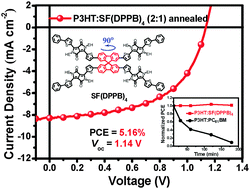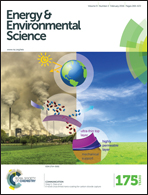A spirobifluorene and diketopyrrolopyrrole moieties based non-fullerene acceptor for efficient and thermally stable polymer solar cells with high open-circuit voltage†
Abstract
In this study, we design and synthesize a new non-fullerene electron acceptor, SF(DPPB)4, in which a spirobifluorene (SF) core is installed with four benzene endcapped diketopyrrolopyrrole (DPP) arms. SF(DPPB)4 exhibits energy levels matching perfectly with those of the commonly used poly(3-hexyl thiophene) (P3HT) donor in polymer solar cells (PSCs). Furthermore, a designed cross-shaped molecular geometry helps in suppressing strong intermolecular aggregation in the P3HT : SF(DPPB)4 blend, leading to efficient non-fullerene PSCs. The resultant devices give a maximum power conversion efficiency (PCE) of 5.16% with an extremely high open-circuit voltage (Voc) of 1.14 V. In contrast, the devices based on P3HT : PC61BM blends provide a PCE of 3.18% with a Voc of 0.62 V. Finally, we observe that the P3HT : SF(DPPB)4 devices exhibit significantly improved thermal stability from that of the P3HT : PC61BM devices; upon thermal treatment at 150 °C for 3 h, the PCEs of P3HT : SF(DPPB)4 devices remain unchanged, whereas those of the P3HT : PC61BM devices drop drastically to below 1%. The abovementioned results demonstrate that the new design strategy of employing a high-performance non-fullerene acceptor, SF(DPPB)4, is promising for the future practical application of PSCs.


 Please wait while we load your content...
Please wait while we load your content...